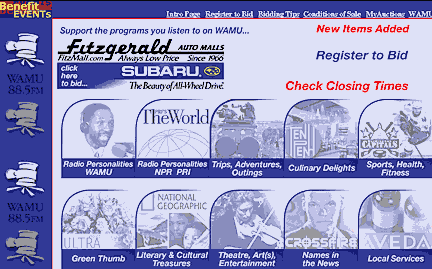

Now even radio stations can show off merchandise for auctions, if they move them largely to the Web, as Washington's WAMU-FM did (web page pictured).
Moved to the Web, auctions save airtime, boost net returns
Originally published in Current,
Oct. 7, 2002
By Dan Odenwald
When Detroit Public Television broadcast its last auction in May 2000, the station grossed more than $500,000. But after paying the engineering, studio and overtime costs for the six-day production, the station netted barely a tenth of that.
For years, the station's auction proceeds had dwindled as costs rose, says Michelle Gaisser, special events manager. The business model was failing, and something had to change. The answer came from the Web.
The Detroit station and others have moved their auctions to the Web as they confront mounting pressure to raise money without preempting programming, says Rick Lore, director of on-air fundraising at PBS.
Of the 65 or so stations that produce auctions, four conduct them exclusively on the Web: Detroit PTV, WLIW in New York, WXXI in Rochester and KPBS in San Diego, according to Lore. Several others are trying online mini-auctions or blending online components with broadcasts. Even a couple of public radio stations--WBUR in Boston and WAMU in Washington, D.C.--are auctioning online.
In Detroit, Gaisser found going online lowered costs, regained primetime hours and freed up more than 100 staffers and volunteers. An event that once brought the station to a weeklong standstill is now handled by one person.
While e-auctions still gross less than on-air sales, Gaisser says, they continue to grow and attract new audiences. Since its first online experiment in November 1999, Detroit PTV has raised more than $230,000. The station netted $30,000 in a three-day web auction in June. Gaisser plans five-day auctions in November and May.
Before moving its auctions online last year, WLIW gave them more than 21 hours of primetime real estate annually. While auctions attracted new viewers, they alienated the core audience, says Laura Savini, v.p. of marketing and communications.
The station's first web auction experiment in February 2002 raised approximately $70,000 and the next, in June, grossed $225,000--about half of what WLIW's on-air auction typically raises.
Web auctions are a powerful new development tool that can bring in new donors and protect the integrity of the schedule, Savini says. WLIW decided to move online with its core viewers in mind, she says.
Rocky Mountain PBS in Denver introduced online bidding to supplement their on-air auctions, says Suzanne Banning, auction manager. In April 2002, the station posted descriptions of all of its merchandise online for pre-auction bidding. In the end, more than 40 percent of the successful bids came from the Web. "If we hadn't had that extra income, we wouldn't have made our goal," Banning says.
As more and more development pros discover these early success stories, online auctions will grow in popularity, Lore says.
A giant auction stays put
But not all pubTV auctioneers are racing to the Web. There's still a lot of life left in on-air auctions, says Phil Collyer, who produces the auction for Boston's WGBH, one of the oldest (37 years) and most lucrative in the business. Its annual revenue has topped $1 million for a decade and hit $1.4 million this year, Collyer says. Over seven days, viewers can bid on more than 6,000 items, ranging from tours of Italy to hot water heaters.
Though WGBH posts some merchandise descriptions online for early bidding, Collyer says it's reluctant to move the auction to the Web. The auction is too big to be conducted efficiently online, he says, and donors who submit goods for auction want to see their gifts displayed on TV. More importantly, the station is reluctant to cut its ties to hundreds of volunteers who run the event each year, says Collyer. The loss of airtime during auctions is less of an issue for WGBH, which maintains PBS programming on its second channel, WGBX.
Still, management cut the auction by approximately 18-20 hours this year.
Though auction revenues aren't a significant part of the overall WGBH budget, the money is prized for being unrestricted, Collyer says. Unlike foundation support, it can be used to pay the light bill. Yet nearly half of its proceeds pay for the event itself, which costs about $500,000 to produce.
On-air auction proceeds are more important at sister station WGBY in Springfield, Mass. They yield $300,000 to $400,000 annually, says Dawn Hines, director of auctions. Because of their success and volunteer involvement, she doesn't predict they will go completely online.
But Hines also feels obligated to reduce the airtime she spends promoting merchandise. "If we sat back and did nothing online, it would be wrong," she says. "But we are television, and I wouldn't want to give that up completely."
Radio joins the game
"Maybe the next big thing in pledge isn't pledge after all," says Nancy Kruse, a development consultant for WAMU. The station's first online auction, which ended last week, netted more than $110,000 without preempting programming.
In light of depressed underwriting and overworked pledge drives, online auctions may become a significant new source of revenue for public radio stations, Kruse says.
WAMU launched its nine-day auction Sept. 23 and expected 500 listeners to register and bid on merchandise. But more than 1,500 listeners signed on to buy 350 items, ranging from lunch with NPR President Kevin Klose to a new Subaru.
Next year, she hopes to more-than-double revenues to $250,000 by attracting even more listeners to bid on 1,000 items.
"Online auctions are a growing trend in philanthropy," Kruse says. Organizations ranging from the American Red Cross to the University of California at Berkeley have enjoyed great success with e-auctions, she reports.
WAMU spent nine months planning the auction, outsourcing it to Kruse's fundraising firm. For three months Kruse dedicated two full-time staffers to the auction.
The station's national stars, Kojo Nnamdi and Diane Rehm, taped promos. Merchandise was carefully selected or events designed to match listeners' sensibilities. Typical items included autographed copies of books discussed on talk shows, tickets to arts and cultural events, and events with pubradio personalities. Lunch with Sylvia Poggioli, for example, fetched $2,650; with Klose, $950. Someone else paid $1,000 to attend a minor league baseball game with Neal Conan.
"We're not selling items, we're offering public radio listeners opportunities to connect with the service they rely on," Kruse says. Above all, WAMU aimed to avoid the Home Shopping Network feel of public TV auctions, she says.
Reports of WAMU's success are already spreading among pubradio development pros. On the final day of the auction, Kruse was fielding calls from about a dozen interested stations.
WAMU isn't the first pubradio station to try online auctions. In 1999, Boston's WBUR held two web auctions, which raised about $25,000 for the station, according to Jay Clayton, director of marketing.
He believes WAMU is setting a good example by being true to the core values of the public radio audience. "If you look at the stuff they're auctioning off, it speaks to the interests and values of the listeners whether they're directly related to a program or not," he says.
"Online actions are something to pay attention to," he says. ""There are only so many pledge drives you can put on the air before you see diminishing returns."
 |
To Current's home page |
| Earlier news: Diehards have innovated with auctions, but nationally they're earning less and less, 1991. |
Web page posted Oct.
10, 2002
Current
The newspaper about public television and radio
in the United States
A service of Current Publishing Committee, Takoma Park, Md.
E-mail: web![]() current.org
current.org
301-270-7240
301-270-7240
Copyright 2002